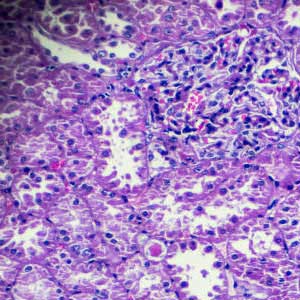Kidney Biopsy hospital in Vijayawada
A kidney biopsy is a minimally invasive medical procedure used to obtain a small tissue sample from the kidney for diagnostic purposes. It involves guiding a thin needle into the kidney, typically under ultrasound or CT imaging, to extract tissue for analysis. This procedure helps doctors identify the cause of kidney problems, such as inflammation, infection, or damage, and assess the severity of kidney diseases like glomerulonephritis or lupus nephritis. Kidney biopsy results guide the nephrology specialist in Vijayawada to make treatment decisions and help monitor disease progression or response to therapy, providing critical insight into the health and functioning of the renal system.
Percutaneous biopsy (renal needle biopsy)
Percutaneous renal needle biopsy is a minimally invasive diagnostic procedure used to obtain kidney tissue samples for histopathological examination. The procedure involves local anesthesia, after which a thin needle is inserted through the skin into the kidney to extract small tissue cores. This technique is invaluable in diagnosing various renal pathologies, such as glomerulonephritis, vasculitis, and unexplained proteinuria or hematuria. It offers significant advantages over open biopsy, including reduced discomfort, shorter recovery time, and lower complication rates. However, potential risks include bleeding, hematoma, or, rarely, injury to adjacent organs. Proper patient selection, pre-procedure coagulation assessment, and post-biopsy monitoring are essential to ensure safety. Overall, percutaneous renal biopsy remains a cornerstone in nephrology at kidney biopsy hospitals in Vijayawada for accurate diagnosis and guiding targeted therapy.

Open Biopsy
An open biopsy, also known as surgical biopsy, is a procedure in which a surgeon makes an incision to remove a larger tissue sample or entire abnormal area for diagnostic examination. This method is typically employed by a kidney Biopsy hospital in Vijayawada when less invasive techniques, like needle biopsies, are inconclusive or insufficient for accurate diagnosis. During the procedure, the surgeon carefully excises the tissue while preserving surrounding structures, often under local or general anesthesia. The tissue sample is then sent to a pathology laboratory for histopathological analysis to determine the nature of the lesion, whether benign or malignant. Open biopsies provide ample tissue for comprehensive evaluation, which is especially valuable in complex or deep-seated lesions. Postoperative care includes wound management, pain control, and monitoring for complications such as infection or bleeding. While more invasive than needle biopsies, open biopsies remain a vital diagnostic tool in cases requiring extensive tissue sampling for accurate disease characterization.
Pre-Op preparation
Preparing for a renal biopsy involves informing your healthcare provider about all medications, including prescription drugs, over-the-counter remedies, and herbal supplements, since some may need to be paused or adjusted prior to the procedure, especially anticoagulants, NSAIDs, or any blood-thinning agents. Additionally, it's important to notify your doctor if you suspect you're pregnant or confirm pregnancy, as well as to undergo pre-procedure blood tests and urine analysis to rule out infections or other concerns. Fasting for approximately eight hours before the procedure is typically required, and if sedatives are prescribed for home use, arrange for someone to drive you afterward, as you won’t be able to operate a vehicle post-sedation.
Misconceived ideas about kidney biopsy
Kidney biopsy is often misconceived as a simple, routine office procedure, but it is actually a surgical intervention performed under general anesthesia in hospital or outpatient settings, with considerations for its necessity based on individual diagnostic needs; it is not universally required for all kidney disease cases, as alternative tests like imaging and blood work can suffice in some scenarios. Additionally, while it can be beneficial in early stages of kidney disease to identify specific conditions such as FSGS or lupus nephritis, it is equally pertinent for advanced cases. Despite common fears, the procedure is relatively safe, with most complications being minor, such as temporary bleeding or infection, emphasizing that its risks are manageable with proper medical care.
Kidney biopsies serve crucial roles in diagnosing, developing treatment strategies, assessing progression, gauging damage, monitoring therapy effectiveness, and evaluating kidney transplant health. Dr. M. V. Sai Krishna, a distinguished nephrologist at Sunrise Kidney Centre in Vijayawada, is renowned for his compassionate care and expertise, particularly in providing advanced treatments such as peritoneal dialysis in Vijayawada, ensuring patients receive personalized and comprehensive kidney care tailored to their needs.

